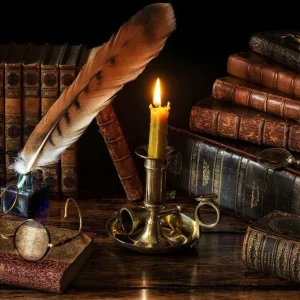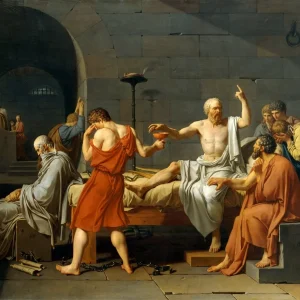
There are some books, you know, that you can’t help but read. Works that were so important to their generation or influenced their historical period must be read to understand how our society became what it is today. Some stories bring to light the most authentic essence of the human being, the feelings that guide us and the primordial instincts that inevitably condition our choices; others, however, tell of alternative worlds and dystopian futures that have proved to be almost prophetic for what are our days.

There are so many books and novels to read at least once in a lifetime, and their choice can be so personal that it is impossible to group them all in one list, but I tried anyway. These are the books that changed my life.
The Perfume, by Patrick Suskind
Paris, 18th century. Jean-Baptiste Grenouille is an orphan with a superhuman sense of smell, allowing him to perceive any smell or nuance in the air. At the same time, however, he is incapable of feeling human feelings and contempt and disgust for other people. One day a girl crosses her path with a sublime smell so intoxicating that Grenouille decides to kill her to be able to smell her without hesitation. Hence his desperate search for the perfect perfume, which, when properly composed, will be able to bend the will of men to his own.
George Orwell’s Animal Farm
In this apologue, an acute satire against totalitarianism combined with inventive happiness and stylistic energy have made “Animal Farm” one of the most famous works of twentieth-century fiction. The story’s protagonists are a group of animals who live on a farm. Tired of the abuses, they rebel against humans and, having driven out the owner, give life to a new order based on equality. Soon, however, a new class of bureaucrats emerges among them, made up of pigs, who, with cunning, greed and arrogance, manage to impose themselves on the other animals.
Don Quixote de la Mancha, by Miguel de Cervantes
Passionate about romances of chivalry, the hidalgo Don Quixote is convinced that he is an errant knight and sets off in search of his Dulcinea, riding a nag and armed with a cardboard helmet. Sancho Panza, a faithful squire with whom he will share improbable adventures around Spain, is accompanying him on his journey. With this novel, Cervantes bears witness to the crisis of confidence of his time and the inadequacy of the nobility of the time in facing a world without ideals.
War and Peace by Lev Nikolaevich Tolstoy
One of the most important historical novels in literature, a precise portrait of the Russian nobility in the Napoleonic era and an accurate description of the period in which the events unfold. Joys, fears, pains and hopes move historical and fictional characters in a complex narrative plot guided by an unpredictable destiny that binds the protagonist families in an almost essential way. An epic poem — as defined by the author himself — in which the darkest and kindest sides of the human soul are rendered in black and white in a compelling and always current work.
The Trial, by Franz Kafka
K. is a bank employee, pragmatic and rational. One day two government officials show up at his house and declare him under arrest, but without detaining him in any way and without informing him of the accusation. K. is sure that it is just a misunderstanding and tries to get to grips with the situation with the logic that characterizes it. But everything seems clouded: the court, the interrogation, and even his lawyer need to explain the situation or the measures he is taking. The cryptic characters and dark story make this work one of the most emblematic of Kafka’s anguished and depersonalizing style. For many, a masterpiece on how lucidity cannot prevail over the ineluctability of an incomprehensible justice.
1984, by George Orwell
A lucid and chilling depiction of totalitarianism and one of the best books ever written. 1984 is set in a dystopian future where the entire world population is perpetually controlled by Big Brother, who no one has ever seen but whose billboards hang everywhere. Winston Smith is one of the officials at the Ministry of Truth, responsible for censoring any communication not in line with official policy. Despite his work and apparent calm, Smith begins to no longer tolerate the constant presence of the regime and begins to write a diary.
Il Barone Rampante by Italo Calvino
This is the story of Cosimo di Rondò, who lived in Ombrosa, in Liguria, in the second half of the 18th century. The young Cosimo, tired of the constant reproaches of his educators, decides one day to escape him by hiding in the top of a tree. The problem, however, is that he decides never to go down again. Cosimo will spend his life among the highest branches of the trees, where he builds a whole world, arousing wonder and admiration in anyone who discovers his story.
The Great Gatsby by Francis Scott Fitzgerald
Considered a classic of American literature, the novel tells the story of Jay Gatsby, the son of a couple of farmers from the Middle West who, after joining the army, meets the heiress Daisy Fay and falls in love with her. Before leaving for the Great War, Jay swears eternal loyalty to Daisy, but in her absence, she marries the famous polo player Tom Buchanan. Back from the war, Jay, now a millionaire, decides to win Daisy back and establish a relationship with her. From Jay’s relationship with Daisy, a series of tragic events will result in the death of many people, including Gatsby himself.
Moby Dick, by Herman Melville
The most famous white whale in the history of literature. Herman Melville recounts Captain Ahab’s epic pursuit of Moby Dick as if it were a cross between the Old Testament, a thriller, a Shakespearean play and a treatise on metaphysical zoology. And he does it with memorable descriptions that remain in his mind for the rest of his life—a masterpiece of American and world literature to read.
The Picture of Dorian Gray by Oscar Wilde
A handsome but naive young man has his painter friend Basil Hallward portray him. Meanwhile, Lord Henry Wotton introduces him to the pleasures of the flesh, which exhaust man and his moral qualities leading him towards his dissolution. Dorian Gray maintains his appearance as a young and handsome scion of good society by hiding under his candid appearance, what instead the observation of the painting reveals to him. An intense and shocking book for the time, which forced the author Oscar Wilde to hard changes due to censorship. Still today a compelling book that has inspired films and TV series.
To Kill a Mockingbird by Harper Lee
It is one of the most appreciated and loved novels in American literature which still today deals with highly topical topics such as racism and civil and fundamental human rights. The story, set in Maycomb, Alabama, tells the story of Jean Louise Finch, a young girl who lives with her brother and father, Atticus. Their life will suddenly turn when the father, a famous lawyer, takes the defence of a black man; the latter is accused of sexual assault on a young white girl—a book from ninety years ago, still strongly alive and with touching themes: an unmissable classic.
Crime and Punishment by Fedor Mikhailovich Dostoyevsky
Is it a crime to eliminate a person if that death can benefit many and save the lives of many people? The work accompanies us in the psychological process of the young Raskolnikov, who decides to kill an old loan shark to save his life, strengthened by his moral superiority and the idea of being right. A journey into the depths of the human mind on the scenario of Petersburg in the second half of the 19th century
Lolita by Vladimir Nabokov
Humbert Humbert, a thirty-six-year-old literature professor and narrator of the whole novel, fails marriage and, after recovering from a nervous breakdown, moves to the small town of Ramsdale in New England. Here he meets and falls head over heels for Dolores, Lolita, the twelve-year-old daughter of his tenant and with whom, after becoming her stepfather, he enters a sexual relationship. As soon as it was published, the novel immediately caused a scandal for the scabrous content that brought to light the passion of a mature man for an unripe teenager; only a few managed to glimpse that, in reality, it would turn into one of the best texts on the passion that have crossed our history.
Blindness, by José Saramago
A mysterious epidemic strikes the population of an unknown city. People are going blind, and the disease appears to be contagious. The reaction of the other inhabitants is ferocious, dictated by fear and bestiality that only pure terror can awaken. The sick are locked up in asylums to try to confine the contagion. In doing so, patients and torturers completely lose their humanity and selfishness, brutality, and indifference take over.
One, none and one hundred thousand, by Luigi Pirandello
Last novel by Luigi Pirandello, published in 1925, in which, more than any other work of his, the author’s thought is rendered. Vitangelo Moscarda’s whole existence is thrown into crisis by a casual remark from his wife about his nose: it’s a little crooked. He had never noticed it before, and with this new awareness, his identity is destroyed. The narration is carried out mainly by monologues of the same protagonist addressed to the reader. The result is a bitter novel imbued with Pirandello’s deep humour, which takes the breakdown of a character to the extreme, as never before.



